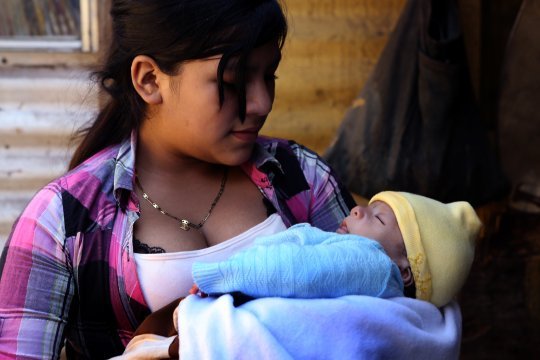This holiday was established by the United Nations exactly a decade ago. And it’s not about celebrating here, but about drawing attention to the challenges that girls and young women all over the world are facing. The theme of this year’s International Day of the Girl Child is “Digital Generation, Our Generation”. Because technologies can really make life easier and solve problems that girls struggle with.
“Fighting stereotypes about women and girls is a fight to unleash their full potential. That is why all Kulczyk Foundation projects have a common denominator – gender equality in the fullest sense of the word. This also applies to equal access to technologies and the possibility of using them. Both for boys and girls, without imposing any roles in advance,” says Karolina Zelent-Śmigrodzka, Managing Director of the Kulczyk Foundation.
HELPING AND TEACHING TO HELP
For two years, the Kulczyk Foundation has been cooperating with the organisation Project Elimu from Kenya, which supports Kenyan youth, helps in access to education, including by funding scholarships, it develops the responsibility of young people and cares about their self-esteem and mental condition. On the other hand, the effect of cooperation with Kulczyk Foundation is the “Smile Bank Project”, which counteracts menstrual poverty. It also promotes knowledge about reproductive health among girls living in Nairobi slums – for example, classes on this subject are conducted under the project in 13 local schools.
“Here, people live on two, or even one dollar a day, and others do not even have that much. In this situation, menstrual products are not a first-choice purchase. That is why it is so important that we can support girls and young women,” says Mike Wamaya from Project Elimu. “As many as a thousand girls from the age of 11 to 18 have access to sanitary products – sanitary pads and sanitary containers. They do not have to pay for them, but receive them on condition that they are involved in the life of the community, that they will help someone.
Mike Wamaya says that some girls help older people with shopping or cleaning, or bring water, while others support teachers in schools. “Because it’s not about giving someone something for free, it’s about helping and teaching how to help,” says Mike Wamaya.
After the schools were shut down by the pandemic, Project Elimu began to distribute hygiene products to kiosks and disseminate information on reproductive health via text messages.
BREAKING OUT OF THE CIRCLE OF POVERTY
The Juanfe Foundation, on the other hand, is looking at the problems of young Colombian women with its “360 degrees” programme. “Very early motherhood is a huge problem in Colombia,” says Catalina Escobar of the Juanfe Foundation. “About 20% of young mothers are girls under 18 years of age. They often come from very poor backgrounds, and their mothers also gave birth to them young. A cycle of poverty is created that is inherited by successive generations. And early motherhood, when children have children, often takes away the chance of getting an education, a profession, a chance for a better life.”
The Juanfe Foundation wants to break this cycle of poverty. Supported by the Kulczyk Foundation, the “360 degrees” programme is aimed at teenage mothers from the Colombian city of Cartagena. The plan is that for three years about 900 girls are fully cared for, motivated, educated and supported so that, despite the difficult situation and premature motherhood, they can achieve independence and a profession that will allow them to support themselves and their children. Juanfe’s staff of social workers, nurses, psychologists and counsellors help with this. “Our pupils need not only education, a good profession that will give the possibility of employment and earning money, but also faith in their abilities. We are also working on it,” says Catalina Escobar.
The girls are learning how to take care of themselves and their children – both physically and emotionally, they are being educated on how to solve conflicts, how to manage their finances. The next part of the project is learning practical skills that allow you to get a profession. There is also a part three, which is learning entrepreneurship. Some of the educational activities are conducted online. Girls who did not have tablets or smartphones receive them during the programme. The Juanfe Foundation also provides them with internet access. Programme participants can also count on meals and consultations with a gynaecologist. “All this so that these girls have a better life than their mothers. So they can become independent and break out of poverty.”
USING THE POWER OF WOMEN
Girls from Uganda, a country where limited access to contraception means that an average woman has more than five children, also need support. And only 35% of women and girls can take care of hygiene during menstruation. “Observations of family expenses show a dramatic conclusion: a man spends more on beer than a woman on menstrual hygiene,” says British researcher Emily Wilson, who has founded the Irise organisation supporting girls in Uganda for the last decade. Emily Wilson asked the youngest Ugandans why they were skipping school. And she heard that the reason is often menstruation, or rather the fact that during menstruation, students have no way to take care of their hygiene. Cloths or banana leaves are often an imperfect substitute for menstrual hygiene products. That’s why Irise helps young women fight menstrual poverty. “And there really is a lot to fight,” Emily Wilson sighs. “Sometimes when a girl grows up and begins to menstruate, she becomes an additional burden for the family, because the expenses for hygiene increase. This is one of the reasons why very young girls feel a strong pressure to get married as soon as possible, because then they will leave the house and be a burden on their husband, not on their parents.”
Emily Wilson has more less than merry observations: “A wife who is economically dependent on her husband must ask him for money for literally everything, including menstrual products. Not only is this humiliating, but it often leads to tensions and outbursts of aggression in poor families where every expense is a challenge.”
Therefore, in her organisation, Wilson primarily focuses on supporting the entrepreneurship of young women. “Because a woman with her own income is more respected in her own family, which in Uganda, where gender inequality is very pronounced, is especially important,” she says.
The Kulczyk Foundation joined in by co-financing the project “Rise Up” which supports female entrepreneurship. “We use the strength of women to support each other and encourage action. Using a virtual platform, female entrepreneurs contact high school students and become their mentors,” says Emily Wilson. Girls are encouraged to run micro-enterprises, selling, for example, menstrual products, vegetables or fruit. At the moment, 20 female entrepreneurs are mentoring 40 girls in the programme. “This could be the beginning of important changes for the better in women’s lives,” Emily Wilson emphasises.
PROTECTING GIRLS FROM VIOLENCE
Another project supported by the Kulczyk Foundation is the initiative of the Guatemalan organisation El Patojismo. In a country where 56% of the country’s population lives below the poverty line, and 23% in extreme poverty, the situation of girls is particularly difficult. They not only struggle with malnutrition and health problems, not only drop out of school to work and support their families, but are also exposed to violence. Guatemala is a country where feminicide and violence against women are particularly frequent occurrences, teenagers are the targets of rapists, and the percentage of child pregnancies is very high. El Patojismo runs an educational centre where, in addition to music, theatre, sports and new technology activities, the youngest can also dine. The Kulczyk Foundation helps El Patojismo create a non-violent space for girls, with support for physical and mental health and access to free menstrual products. An application is used for efficient communication and knowledge transfer – a tool with information on reproductive and sexual health.
Author: Agnieszka Urazińska
Photo: pexels.com
The text was published in „Wolna Sobota” a magazine of „Gazeta Wyborcza” on 9 October 2021



